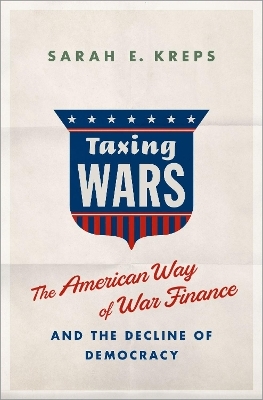
Taxing Wars
Oxford University Press Inc (Verlag)
978-0-19-086530-6 (ISBN)
As Sarah Kreps shows in Taxing Wars, the type of debt financing for war that we have seen since 9/11 could not have been more different from earlier experiences when wars meant taxation. For instance, in 1914-three years before America's direct involvement in World War I-President Wilson urged war taxes as a way to fund defense preparations. Indeed, the Wilson Administration levied a series of war taxes before, during, and after the war, amounting to about one-third of the war's costs. Why, when Wilson was aiming to recruit rather than repel support for the war, did he introduce measures such as a hefty war tax that recent leaders have considered politically toxic? Why was the public so magnanimous in its willingness to contribute its own resources? By contrast, why did leaders not use the crisis of war, often used as entrées for introducing war taxes in the past, in the aftermath of 9/11 to extract resources from the populace in a way that been customary in the past? More generally, what explains shifting attitudes towards bearing the financial burden of war and the move away from war taxes, and the consequences of that shift?
Kreps argues that the starkly different approaches are the result of public attitudes towards wartime fiscal sacrifice that vary depending on the underlying type of war and state-society relations. The public accepted the sacrifices that the state demanded during the two world wars, an effect of both the nature of those wars and the public's more favorable views toward government in that era. However, when these factors combine to make the public cost sensitive, leaders have pursued forms of war finance that anticipate opposition and minimize constraints on the way they use force. In post-1945 wars, the public has become almost uniformly unforgiving of fiscal sacrifice, which explains leaders' increased tendency to rely on less visible forms of finance such as borrowing. The lack of visibility has had an important knock-on effect too: Leaders have been able to increasingly operate without the type of decision-making constraints that were present in earlier war efforts which depended upon broader levels of public support. Her ultimate conclusion is both sobering and extremely important: the deterioration of decision-making accountability with regard to war in the second half of the twentieth century has allowed leaders to wage increasingly costly and protracted wars. And because the health of a democracy can be measured by how responsive leaders are to an informed and attentive public in times of war, our current practices suggest that we are edging ever closer to how non-democracies conduct war.
Sarah E. Kreps is an Assistant Professor in the Department of Government at Cornell University. She previously held fellowships at the Belfer Center for Science and International Affairs, Harvard University, and the Miller Center for Public Affairs, University of Virginia. Between 1999-2003, Kreps served as an active duty officer in the United States Air Force. She is the author of Coalitions of Convenience (OUP) and Drones: What Everyone Needs to Know (OUP).
Chapter One
Introduction
Chapter Two
Bearing the Financial Burden of War
Chapter Three
Partisan Politics in the Early Wars: Conflicts of 1798, 1812, and 1898
Chapter Four
The "Liberty Bond" Approach to War Finance: World Wars I and II
Chapter Five
From Taxation to Borrowing: Declining Fiscal Sacrifice in Korea and Vietnam
Chapter Six
"Hide-and-Seek" Wars: The Afghanistan and Iraq Wars
Chapter Seven
Cross-National Survey Evidence from the US, UK, and France
Chapter Eight
Conclusion
| Erscheinungsdatum | 12.06.2018 |
|---|---|
| Verlagsort | New York |
| Sprache | englisch |
| Maße | 163 x 239 mm |
| Gewicht | 544 g |
| Themenwelt | Recht / Steuern ► Steuern / Steuerrecht |
| Sozialwissenschaften ► Politik / Verwaltung ► Politische Theorie | |
| ISBN-10 | 0-19-086530-X / 019086530X |
| ISBN-13 | 978-0-19-086530-6 / 9780190865306 |
| Zustand | Neuware |
| Haben Sie eine Frage zum Produkt? |
aus dem Bereich


